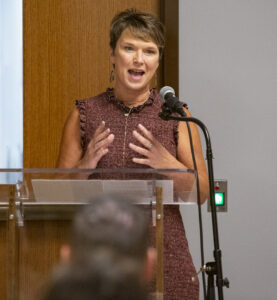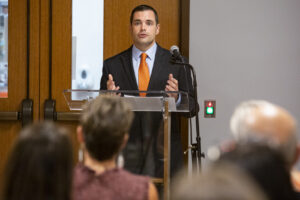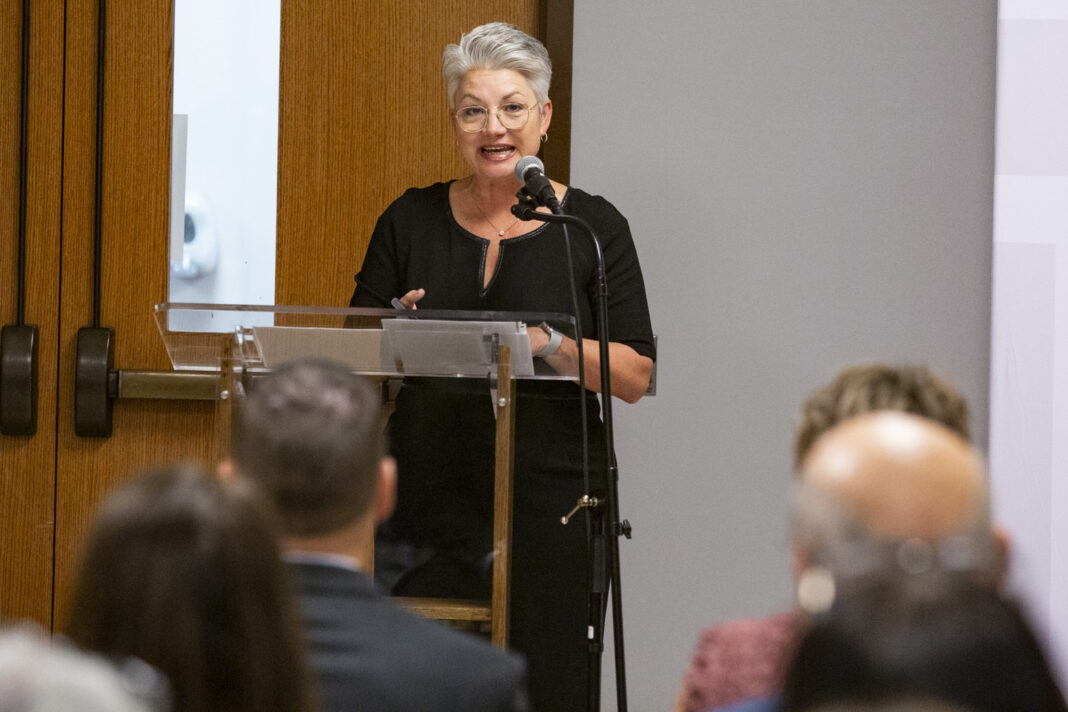University of Texas Permian Basin and Midland Health announced a practice-academic partnership that allows fourth-semester nursing students who are in the MMH Nursing Intern Program to work alongside nurses.
Begun in August, the students work during precepted clinical hours, which are required to graduate. The goal is to provide relief to current nurses who are dealing with significant staffing challenges due to COVID-19 and allows UTPB nursing students to gain more confidence through hands-on learning, a news release stated.
The announcement took place in the simulation lab on the third floor of the Mesa Building.
UTPB President Sandra Woodley said the program offers “unparalleled opportunity for nursing students to assist the community in a time of crisis.”
“… This partnership ties directly to one of our strategic pillars at the university, and that is to serve this region. And healthcare is a growing priority for this community, and certainly a growing priority for this university,” Woodley said.

Dean of the College of Health Sciences and Human Performance Donna Beuk said the Texas Board of Nursing sent out in early August the opportunity for schools of nursing to join more “academic, clinical partners and bring about a really innovative opportunity for our senior nursing students” and that was to combine clinical training with the opportunity to be compensated for that.
To do that, it took a strong partnership and a separate agreement, Beuk said.
“… We reached out to Midland Health and talked with their leadership team and formed this amazing articulation agreement. … We were excited because we have some amazing fourth semester nursing students and they are well prepared. But one of the things that we really want to make sure of is that when they graduate, that they are prepared to go into practice, and that they don’t hit this pandemic, and go, oh my gosh, what is going on and they leave,” Beuk said.
One of the things that she’s heard is that the reality of the transition to practice can sometimes be very frightening, sometimes resulting in people leaving the practice.
“Recently, I received a message from a nurse that’s been in the practice for over 30 years, that she’s had nurses come out of practice, come out of education, come to work, go to lunch, and not come back,” Beuk said. “That’s not what we wanted for our graduates. They work very hard to learn and to grow and to become professional registered nurses, so we wanted them to stay with us. In our partnership with Midland Health, we wanted to make sure that their nurses that they hire stay with them, and stay with us in the Permian Basin and become professional, excellent practitioners,” Beuk said.
“In this partnership, we really worked very hard to make sure that we are aligned with our mission and vision and strategic goals of the university, as well as those with Midland Health.”
There are 45 students total in the pilot program and 21 will graduate in May.

Midland Health Chief Nursing Officer Kit Bredimus said they have seen through COVID-19 the increased need for nursing staff “like no other time that I can think of.”
“We’ve known for quite some time that there’s a looming nursing shortage, and of course, in the Permian Basin we’ve been subject to that as well. We know that there’s an increased need to get nurses not only in the pipeline, but well prepared to transition into practice quickly and be able to jump in. Through these academic practice partnerships, these are important mechanisms to both strengthen nursing practice and help nurses become well prepared to lead change and advance health,” Bredimus said.
“I know that through implementing these partnerships, both academic institutions and practice settings can address the recommendations from the Institute of Medicine’s Future of Nursing 2020 guidelines, and really help improve health care and equity,” he added.
He added that the partnership is going to create a system for nursing students to achieve not only educational advancement, but prepare for their future career advancement.
“It will also be able to provide them the ability to lead and practice into the future and provide an accelerated pathway structure through our nationally accredited residency program. So as they go through the program, through this partnership and their last semester, they will be able to work hands-on with our nurses at the bedside in a partnership that not only allows them to work with patients, work with nurses, but also extend care at the bedside and extend care for those nurses to be able to exceed what we normally do,” Bredimus said.
He added that nursing students at UTPB have risen to the occasion during the pandemic.
“They have definitely answered the call and our continued efforts to try to get as much help to the bedside as we can. In the clinical setting, the partnership allows the nurse to precept them while extending their care ability in a collaborative practice. So we’re not seeing just a student and preceptor relationship. It is becoming an actual dyad where they’re working together as a team,” Bredimus said.
He added that the partnership improves quality and safety for patients.
“We’ve also been able to respond quickly to needs in times of surge, and it’s been an invaluable resource,” Bredimus said.
Beuk said UTPB school of nursing has had an articulation agreement with Midland Health since 2013. That is a typical clinical-educational practice partnership, she said.
“What this agreement allows is different in that our students that are in their fourth semester of their education, getting ready to graduate actually do a transition to practice preceptive clinical with their nurse at Midland Health,” Beuk said.
“They receive compensation while they’re being precepted, which is a new allowance by the Board of Nursing. But it also allows the students to really engage in a higher level of practice during their clinical internship hours,” Beuk said.
The students that are in the Midland health internship program are also a part of their post graduation residency program.
“And because of that level of accreditation program that they have post graduation, we were very secure in our ability to believe that putting our students out there during a paid precepted clinical experience that their safety and their level of education that they would receive would be at the highest level,” Beuk added.
Woodley said the new partnership is a wonderful, common sense approach.
“I’m so happy that we have it available now and we can provide the paid opportunities for our nurses to get what they need in their financial situation … but also thrive in their quest to become really excellent nurses,” Woodley said.
The pilot is for one year for fall and spring.
“… The Board of Nursing approved this during a COVID pandemic,” so Beuk said they are hoping it will become permanent.
McKynzie Woody, a nursing student, said she has enjoyed the program so far.
“It’s allowed me to grow as a future nurse and feel confident that after graduation I’ll be ready to be a nurse and I won’t feel in the dark about what I’m doing. I’ve really also enjoyed … the compensation side of it. It’s nice to be compensated for all the work that you do as a student,” Woody said.
She added that after the pandemic, things should get easier.
“I think it makes it a smoother transition when you’ve had some experience that’s more realistic, even than school. With the partnership, it’s more like you are … a nurse and so it’ll make the transition a lot easier after school,” Woody said.
She added that she loves caring for people.
“I think it’s nice to be there for somebody when they’re in a bad time their life. I’ll be working in the NICU after I graduate and so what’s cool about that, specifically to me is that those parents are so scared. They want to be able to take their baby home. They expected to have a healthy baby. And so I think it’s nice to provide care for the baby and be an emotional support for the parents,” Woody added.
Jessica Naiman, a registered nurse and academic chair in the College of Nursing, said this opportunity is extremely important for the students because it gives them more hands-on experience than they might normally get.
It also gives students a chance to figure out how to make clinical decisions before they’re out there on their own, Naiman said.




